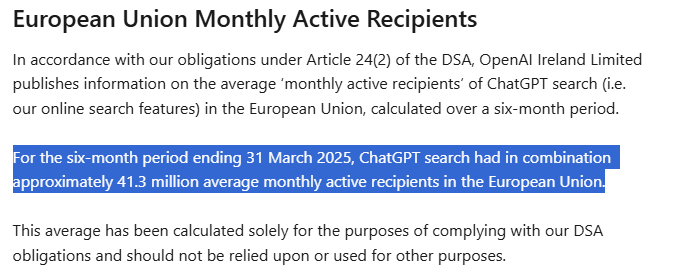ChatGPT Search reaches approximately 41 million monthly users in the EU

OpenAI’s ChatGPT Search recorded approximately 41.3 million monthly users in the European Union over the six-month period ending in March 2025, according to the company’s own data.
The figure represents a nearly fourfold increase from the 11.2 million monthly users reported as of October 31, 2024, based on a screenshot of the site archived in January.
These numbers were disclosed in a mandatory filing under the EU's Digital Services Act (DSA), which requires large online platforms to report user metrics and content moderation efforts. The platform's growth reflects increased interest in generative AI-based search tools, though it remains far behind dominant players in overall usage volume.

Perplexity, another AI-powered search engine, reported around 15 million monthly active users globally in 2024. According to the company, it handled roughly 400 million search queries per month as of October that year.
While notable, those figures are still dwarfed by Google's scale. Estimates place Google's search volume at approximately 8.5 billion queries per day. The company continues to integrate AI into its search infrastructure as part of its broader development strategy.
Early studies suggest that the success of generative AI search platforms may come at the expense of the open web. Traffic generated by chatbots and AI-driven answers appears to be significantly lower than that of traditional search engines like Google, raising concerns about future visibility and referral traffic for independent websites.
This shift also points to an even greater concentration of informational power in the hands of a few technology companies. As users increasingly rely on AI-generated summaries rather than visiting external sources, control over what information is surfaced and how it is framed becomes further centralized.
AI News Without the Hype – Curated by Humans
As a THE DECODER subscriber, you get ad-free reading, our weekly AI newsletter, the exclusive "AI Radar" Frontier Report 6× per year, access to comments, and our complete archive.
Subscribe nowAI news without the hype
Curated by humans.
- Over 20 percent launch discount.
- Read without distractions – no Google ads.
- Access to comments and community discussions.
- Weekly AI newsletter.
- 6 times a year: “AI Radar” – deep dives on key AI topics.
- Up to 25 % off on KI Pro online events.
- Access to our full ten-year archive.
- Get the latest AI news from The Decoder.